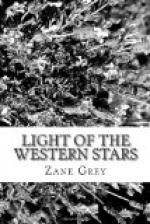Five months brought all that Stillwell had dreamed of, and so many more changes and improvements and innovations that it was as if a magic touch had transformed the old ranch. Madeline and Alfred and Florence had talked over a fitting name, and had decided on one chosen by Madeline. But this instance was the only one in the course of developments in which Madeline’s wishes were not compiled with. The cowboys named the new ranch “Her Majesty’s Rancho.” Stillwell said the names cowboys bestowed were felicitous, and as unchangeable as the everlasting hills; Florence went over to the enemy; and Alfred, laughing at Madeline’s protest, declared the cowboys had elected her queen of the ranges, and that there was no help for it. So the name stood “Her Majesty’s Rancho.”
The April sun shone down upon a slow-rising green knoll that nestled in the lee of the foothills, and seemed to center bright rays upon the long ranch-house, which gleamed snow-white from the level summit. The grounds around the house bore no semblance to Eastern lawns or parks; there had been no landscape-gardening; Stillwell had just brought water and grass and flowers and plants to the knoll-top, and there had left them, as it were, to follow nature. His idea may have been crude, but the result was beautiful. Under that hot sun and balmy air, with cool water daily soaking into the rich soil, a green covering sprang into life, and everywhere upon it, as if by magic, many colored flowers rose in the sweet air. Pale wild flowers, lavender daisies, fragile bluebells, white four-petaled lilies like Eastern mayflowers, and golden poppies, deep sunset gold, color of the West, bloomed in happy confusion. California roses, crimson as blood, nodded heavy heads and trembled with the weight of bees. Low down in bare places, isolated, open to the full power of the sun, blazed the vermilion and magenta blossoms of cactus plants.
Green slopes led all the way down to where new adobe barns and sheds had been erected, and wide corrals stretched high-barred fences down to the great squares of alfalfa gently inclining to the gray of the valley. The bottom of a dammed-up hollow shone brightly with its slowly increasing acreage of water, upon which thousands of migratory wildfowl whirred and splashed and squawked, as if reluctant to leave this cool, wet surprise so new in the long desert journey to the northland. Quarters for the cowboys—comfortable, roomy adobe houses that not even the lamest cowboy dared describe as crampy bunks—stood in a row upon a long bench of ground above the lake. And down to the edge of the valley the cluster of Mexican habitations and the little church showed the touch of the same renewing hand.
All that had been left of the old Spanish house which had been Stillwell’s home for so long was the bare, massive structure, and some of this had been cut away for new doors and windows. Every modern convenience, even to hot and cold running water and acetylene light, had been installed; and the whole interior painted and carpentered and furnished. The ideal sought had not been luxury, but comfort. Every door into the patio looked out upon dark, rich grass and sweet-faced flowers, and every window looked down the green slopes.




